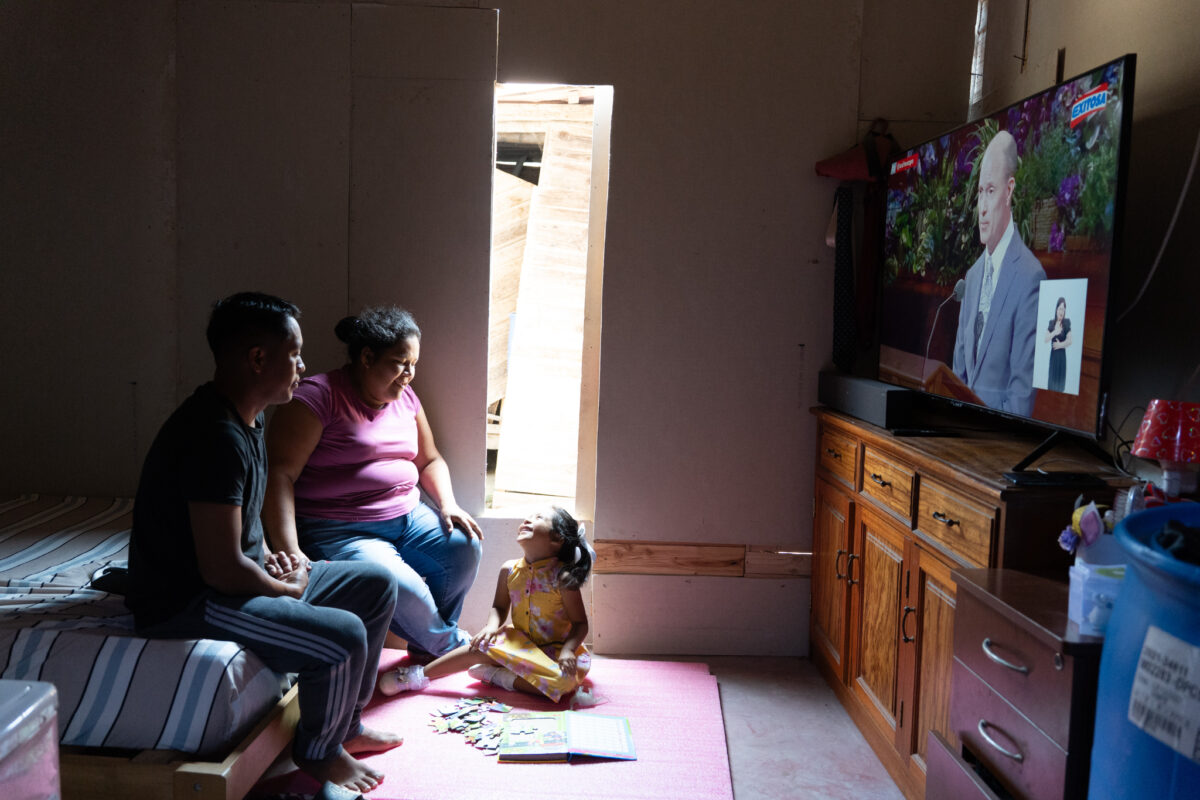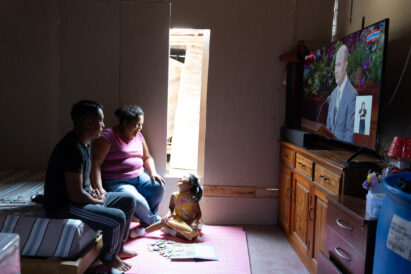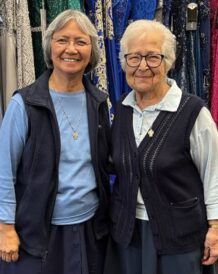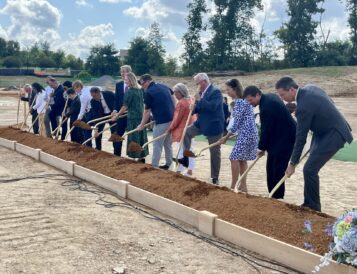Conference Counsel: Serving in church prepares us for Second Coming
- A young family from Peru watches the morning session of general conference on Sunday, April 6, 2025.
- Ryan Comer

Photo supplied, Intellectual Reserve
A young family from Peru watches the morning session of general conference on Sunday, April 6, 2025.
I was trying to decide which general conference talk I wanted to write about this week, and so I started watching the address by Elder Steven D. Shumway, a member of the Seventy in The Church of Jesus Christ of Latter-day Saints, from this past April titled “Participate to Prepare for Christ’s Return.”
It was the second talk during the Sunday morning session.
As the title makes clear, Elder Shumway’s remarks were about preparing for the Second Coming, which has become one of my favorite topics, so I was hooked more than normal already.
As I watched the talk, there was one part that really resonated with me.
“Ordinances don’t save us because they fulfill a heavenly checklist,” Elder Shumway said. “Rather, when we live the covenants connected with these ordinances, we become the kind of person who wants to be in God’s presence.”

Ryan Comer, Standard-Examiner
Ryan Comer
I thought immediately that this might be the best explanation of the importance of works that I’ve ever heard given. Ordinances aren’t like items on some checklist God has that he crosses off once completed, like we’re earning a merit badge on our way to becoming an Eagle Scout. They are necessary steps that, when living by the covenants they are connected with, bring us closer to God, thereby putting us in a position to want to be able to return to him.
The Celestial Kingdom has a fixed standard, and ultimately, we decide whether we want to live that standard by the choices we make.
“I say, ‘No, we are not earning heaven. We are learning heaven,” said Brad Wilcox, former first counselor in the Young Men General Presidency of the church several years ago. “We are preparing for it. We are practicing for it.”
Elder Shumway’s comments about ordinances were part of a larger message about serving in the church in preparation for Christ’s return. If we have shown through our choices that we want to live with Heavenly Father and Jesus Christ in the Celestial Kingdom, then we will be prepared for Christ’s return.
“Callings and other ways we embark in God’s work uniquely prepare us to meet the Savior,” he said in the subhead of his talk as recorded on the church’s website.
In his address, Elder Shumway said that “God is pleased when we engage in his work” and that “our participation is preparation for Christ’s return” before issuing counsel to “help others receive and rejoice in the gift of callings.”
‘God Is Pleased When We Engage in His Work’
Elder Shumway highlighted the need for help serving in the church by pointing to the growth of the church and the increasing number of temples. He acknowledged that serving is not always convenient and said that’s why he admires those who do serve.
“God ‘delights to honor [you for serving Him] in righteousness,'” Elder Shumway said. “He promises, ‘Great shall be [your] reward and eternal shall be [your] glory.’ When we say yes to serving, we are saying yes to Jesus Christ. And when we say yes to Christ, we are saying yes to the most abundant life possible.”
Elder Joseph B. Wirthlin, a former member of the Quorum of the Twelve Apostles, once gave a general conference talk titled “The Abundant Life.”
A memorable quote from that talk is as follows:
“We are all busy,” Elder Wirthlin said. “It’s easy to find excuses for not reaching out to others, but I imagine they will sound as hollow to our Heavenly Father as the elementary school boy who gave his teacher a note asking that he be excused from school March 30th through the 34th.
“Those who devote their lives in pursuit of their own selfish desires at the exclusion of others will discover that, in the end, their joy is shallow and their lives have little meaning.
“On a tombstone of one such person was carved the following epitaph:
“Here lies a miser who lived for himself,
“And cared for nothing but gathering pelf,
“Now, where he is, or how he fares,
“Nobody knows and nobody cares.”
‘Our Participation Is Preparation for Christ’s Return’
Elder Shumway spoke of three principles that show “how our participation in God’s work blesses and helps us prepare to meet the Savior.”
First, “we progress toward ‘the measure of [our] creation.’ as we serve.”
Sister Patricia Holland gave a talk at BYU in 1989 using that phrase as her topic.
“… every element of creation has its own purpose and performance,” she said. “Every one of us has been designed with a divine role and mission in mind. I believe that if our desires and works are directed toward what our heavenly parents have intended us to be, we will come to feel our part in their plan. We will recognize the ‘full measure of our creation,’ and nothing will give us more holy peace.”
Said Elder Shumway:
“Callings do not determine or validate a person’s worth or worthiness,” Elder Shumway said. “Rather, as we labor with God in whatever way He asks, we grow into the measure of our own creation.
“God rejoices in our progress, and so should we, even when we still have work to do. At times we may lack the strength or the means to serve in a calling. Still, we can engage in the work and protect our testimonies through meaningful ways like prayer and scripture study. Our loving Heavenly Father does not condemn us when we are willing but unable to serve.”
Second, Elder Shumway said, our homes and churches are transformed into “holy places where we can practice covenant living” as we serve.
“For example, our covenant to always remember Christ is made individually, but this covenant is lived as we serve others,” he said. “Callings surround us with opportunities to ‘bear … one another’s burdens, and so fulfil the law of Christ.’ When we serve because we love God and want to live our covenants, service that seems dutiful and draining becomes joyful and transformative.”
After mentioning ordinances, as I highlighted at the start, Elder Shumway added:
“This understanding overcomes hesitations to serve or preferences not to serve. Our preparation to meet Jesus Christ accelerates when we stop asking what God will permit and start asking what God would prefer.”
There’s another amazing quote! What do we try to excuse in our lives because we think God “will permit” it? If we really want to be prepared to meet the Savior, then our focus should be on doing what he “would prefer.”
Third, Elder Shumway spoke of receiving “God’s gift of grace” and feeling “His greater love” through participation in his work.
“As we act in faith to do something beyond our abilities, our weakness is exposed,” he said. “This is never comfortable, but it is necessary for us to ‘know that it is by [God’s] grace … that we have power to do these things.’
“We will fall many times as we engage in God’s work. But in our effort, Jesus Christ catches us. He gradually lifts us to experience salvation from failure and fear and from feeling like we will never be enough. When we consecrate our meager but best effort, God magnifies it. When we sacrifice for Jesus Christ, He sanctifies us. This is the transformative power of God’s grace. As we serve, we grow in grace until we are prepared to ‘be lifted up by the Father, to stand before [Jesus Christ].'”
‘Help Others Receive and Rejoice in the Gift of Callings’
In the final part of his talk, Elder Shumway called on leaders to “more intentionally seek those without callings.”
He highlighted a man named John who was not active in the church and smoked. The bishop invited him to quit smoking, and three weeks later, the stake president called John to be in the bishopric.
“If this meant he would have to abandon his tradition of attending professional football games on Sunday, well, that was just too much to ask,” Elder Shumway said.
The stake president said this wasn’t his request; it was the Lord’s. John said if that was true, he would serve.
“I wonder if we have a blind spot, failing to extend callings to individuals who, to our mortal view, appear unlikely or unworthy,” Elder Shumway said. “Or we may be more concerned with a culture of performance than with the doctrine of progression, neglecting to see how the Savior increases capacity in the unlikely and the unproven by giving them opportunities to serve.
“Elder David A. Bednar teaches the importance of the scriptural mandate to ‘let every [woman and] man learn [their] duty, and to act.’ Do we do this? When leaders and parents let others learn and act for themselves, they blossom and flourish. While the easier path may be to give faithful members a second calling, the more excellent way is to invite the unlikely to serve and let them learn and grow.'”
In my ward, I was recently released as an Elder’s Quorum instructor after serving two and a half years in that calling and was called to be the ward clerk. There are some who maybe wouldn’t like that particular change. Elder’s Quorum instructor is relatively relaxed. You prepare a lesson based on a general conference talk once a month. That’s it. And I write about general conference talks in this newspaper each week, so it’s even easier for me.
Ward clerk, on the other hand, involves almost weekly meetings, sometimes two meetings on one Sunday. But when I was called as the ward clerk, I felt proud. Not because I felt like I was moving up some ladder, but because I knew I was being trusted with more responsibility and that meant something to me. It feels good to be trusted. I can’t imagine I’m the only one like that.
Conclusion
Concluding his remarks, Elder Shumway said:
“In earnestly seeking to represent the Savior, we become more like Him. That is the best preparation for the sacred moment when each of us will kneel and confess that Jesus is the Christ, which I witness that He is and that President Russell M. Nelson is His ‘voice … unto the ends of the earth’ to help us ‘prepare … for that which is to come.’ In the sacred name of Jesus Christ, amen.”
Contact Ryan Comer at rcomer@standard.net.




